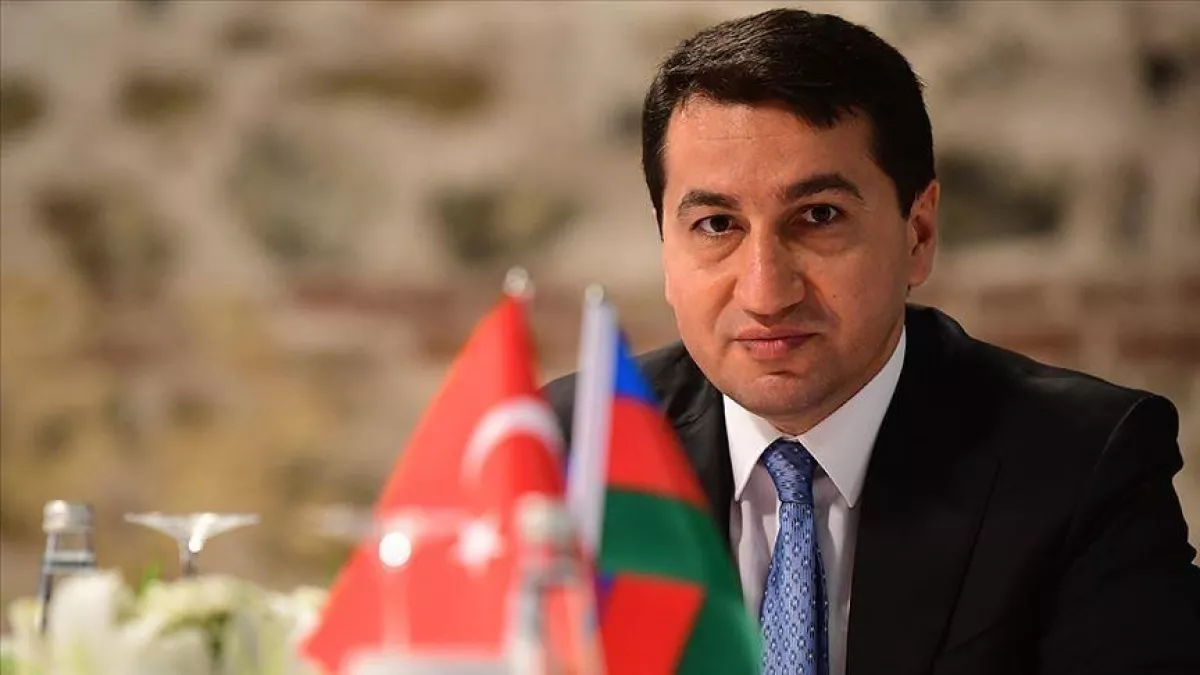“Baku masterfully leveraged Pashinyan’s ‘weaknesses’ and geopolitical circumstances” Expert opinions on Caliber.Az
Hikmet Hajiyev, Assistant to the President of Azerbaijan and Head of the Foreign Policy Department of the Presidential Administration, recently shared two videos on X (formerly Twitter) related to the construction of the Zangezur Corridor infrastructure.

Accompanying a video on the construction of the high-speed highway, Hajiyev wrote: “A few weeks ago, I posted the footage of the railway line of the Zangezur Corridor. Today, I am sharing a video of the high-speed motorway being built as part of the corridor — a project shaping the region’s future.”
Sharing footage from the Aghband–Kalaleh Bridge over the Aras River, the president’s aide noted: “Zangezur Corridor —on the Ağbənd–Kəlalə Bridge over the Araz River. A pivotal hub and intersection connecting major international transport arteries: the East–West route stretching from Shanghai to London, and the North–South and Southwest routes linking the Indian Ocean with the North Sea, and the Persian Gulf with the Black Sea.”
Moreover, U.S. State Department delegations recently visited Baku, Yerevan, and Tbilisi.
This dynamic shows that the Zangezur Corridor and its Armenian section, TRIPP, are rapidly being implemented. But what do experts from countries within the Middle Corridor orbit think about the strategy for this project? Georgian and Kyrgyz political analysts answer this question for Caliber.Az.

Thus, Georgian political scientist and international relations expert, Candidate of Political Sciences, Teimuraz Garishvili believes that Azerbaijan’s strategy, aimed at implementing the Zangezur Corridor concept with minimal geopolitical risks, has proven to be highly farsighted.
“We clearly remember that the opponents of the corridor for a long time were Yerevan and Tehran, who, in effect, blocked any initiatives. However, after several years of negotiations and based on accumulated data, Azerbaijan decided that the best approach was to involve both Yerevan and the forces exerting decisive influence over Armenia’s politics as much as possible.
It seems to me that in Baku they analysed Yerevan’s attempts to draw the attention of major players to its ‘Crossroads of Peace’ project and realised what needed to be done. There was also the factor of Pashinyan’s constant attempts to base his actions on the positions of the world’s powerful: just recall the EU mission and Macron’s patronage, to which Armenia was so drawn.”
It is worth noting that Baku masterfully leveraged its understanding of these ‘weaknesses’ of the Armenian prime minister, as well as the geopolitical circumstances—particularly the temporary cooling of relations with Moscow and the arrival of Donald Trump in the White House, with whom Azerbaijan had maintained relatively good relations during his previous presidential term.
There was no time to hesitate, and Baku managed to interest Yerevan and, in a sense, push through the option most attractive to Armenia—the TRIPP route—where the main actor would not be some distant Paris, but the United States themselves.
Another brilliant diplomatic move by Baku lies in this: Azerbaijan understood very well that, unlike the sluggish Biden administration, Trump would actively promote the TRIPP concept as a symbol of his political achievement.
The current negotiations in Tbilisi with the U.S. State Department delegation, led by Senior Advisor Jonathan Askonas, aimed at involving Georgia in the project, are the clearest demonstration that Baku’s strategy is fully paying off,” said Garishvili.

According to Kyrgyz political scientist and economist Umar Mutaliev, when viewed in a broader context, the Zangezur Corridor is not just a new route, but a tool capable of reshaping economic connections across the vast Eurasian space.
“This route creates additional trade opportunities on the other side of the Caspian and opens strategic prospects for the Central Asian (CA) countries. The fact that its implementation became possible after agreements between Azerbaijan and Armenia only underscores its political depth,” said the analyst.
He also noted that the project’s impact becomes particularly evident when considering the surrounding infrastructure: “The Zangezur Corridor strengthens overall Turkic connectivity, linking Baku with the Nakhchivan Autonomous Republic and Türkiye, and is becoming a key artery of the Middle Corridor. Meanwhile, infrastructure elements such as the Aghband–Kalaleh Bridge—which Baku has described as an important hub and crossing point connecting major international transport arteries, including East–West, North–South, and South–West routes—only amplify this effect. This bridge effectively links the largest transport lines from Shanghai to London, from the Indian Ocean to the North Sea, thereby strengthening Azerbaijan’s role in global logistics. This is no longer merely a technical detail, but part of a new system into which the Central Asian countries are also being integrated.”
Expanding on the topic, the political analyst emphasised that today it is impossible to understand regional developments without analysing the “Azerbaijan–Central Asia” link.
“The significance of transport partnership between Azerbaijan and the Central Asian states cannot be overstated. This vector is important not only for our countries, but also for China, Türkiye, and Europe. Azerbaijan plays a key role in the South Caucasus, while Kazakhstan, Uzbekistan, and Kyrgyzstan form the core of the Central Asian segment of the Middle Corridor. Without their coordinated efforts, the implementation of major logistics projects would simply be impossible.
This close cooperation is not based solely on pragmatism. Baku’s focus on Central Asia is entirely natural, because our states share common historical, cultural, and linguistic roots. The Caspian Sea does not divide us—it unites us. This foundation makes interaction not only symbolically meaningful but also economically efficient.
Today, the countries of the region possess their own strategic weight and belong to the so-called ‘middle powers,’ without which no major infrastructure project can be realised. The prospects for cooperation between Baku and Astana are immense, benefiting China, Türkiye, Georgia, Armenia, and Europe alike. Strengthening such a partnership is a logical and promising direction,” concluded Mutaliev.








